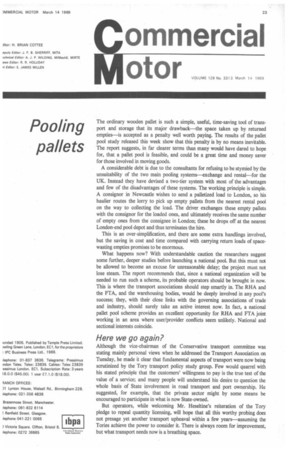ommercial otor
Page 25

If you've noticed an error in this article please click here to report it so we can fix it.
The ordinary wooden pallet is such a simple, useful, time-saving tool of transport and storage that its major drawback—the space taken up by returned empties—is accepted as a penalty well worth paying. The results of the pallet pool study released this week show that this penalty is by no means inevitable. The report suggests, in far clearer terms than many would have dared to hope for, that a pallet pool is feasible, and could be a great time and money saver for those involved in moving goods.
A considerable debt is due to the consultants for refusing to be stymied by the unsuitability of the two main pooling systems—exchange and rental—for the UK. Instead they have devised a two-tier system with most of the advantages and few of the disadvantages of these systems. The working principle is simple. A consignor in Newcastle wishes to send a palletized load to London, so his haulier routes the lorry to pick up empty pallets from the nearest rental pool on the way to collecting the load. The driver exchanges these empty pallets with the consignor for the loaded ones, and ultimately receives the same number of empty ones from the consignee in London; these he drops off at the nearest London-end pool depot and thus terminates the hire.
This is an over-simplification, and there are some extra handlings involved, but the saving in cost and time compared with carrying return loads of spacewasting empties promises to be enormous.
What happens now? With understandable caution the researchers suggest some further, deeper studies before launching a national pool. But this must not be allowed to become an excuse for unreasonable delay; the project must not lose steam. The report recommends that, since a national organization will be needed to run such a scheme, its probable operators should be brought in now. This is where the transport associations should step smartly in. The RHA and the FTA, and the warehousing bodies, would be deeply involved in any pool's success; they, with their close links with the governing associations of trade and industry, should surely take an active interest now. In fact, a national pallet pool scheme provides an excellent opportunity for RHA and FTA joint working in an area where user/provider conflicts seem unlikely. National and sectional interests coincide.
Here we go again?
Although the vice-chairman of the Conservative transport committee was stating mainly personal views when he addressed the Transport Association on Tuesday, he made it clear that fundamental aspects of transport were now being scrutinized by the Tory transport policy study group. Few would quarrel with his stated principle that the customers' willingness to pay is the true test of the value of a service; and many people will understand his desire to question the whole basis of State involvement in road transport and port ownership. He suggested, for example, that the private sector might by some means be encouraged to participate in what is now State-owned.
But operators, while welcoming Mr. Heseltine's reiteration of the Tory pledge to repeal quantity licensing, will hope that all this worthy probing does not presage yet another transport upheaval within a few years—assuming the Tories achieve the power to consider it. There is always room for improvement, but what transport needs now is a breathing space.




















































































































